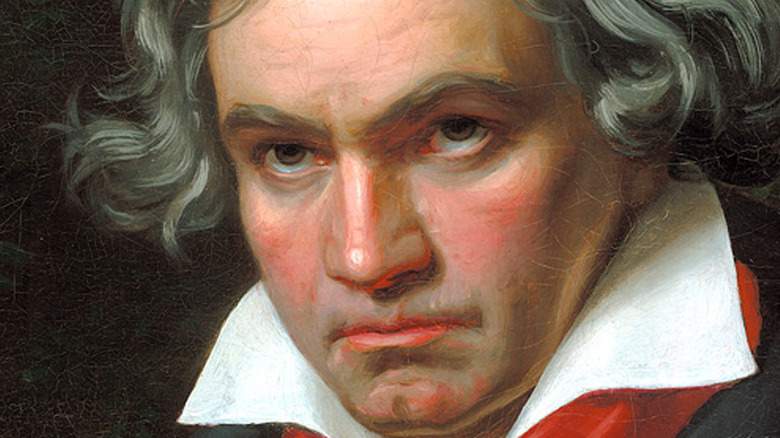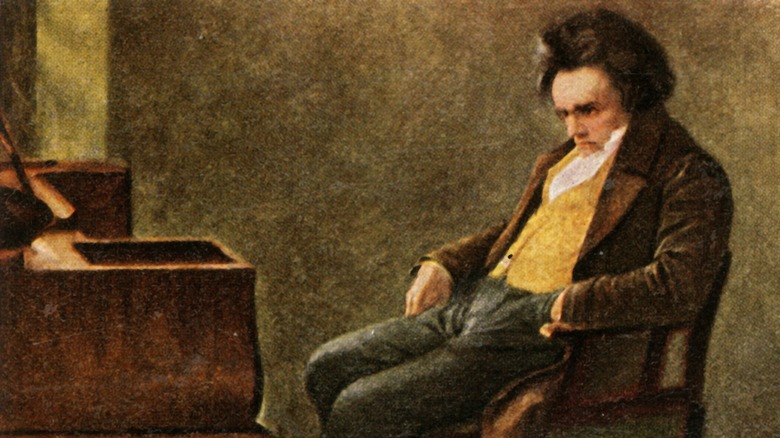Why Did Beethoven Go Deaf?
Nearly 200 years after his death, as Britannica writes, Ludwig van Beethoven is still considered by many to be the world's greatest composer. Some of his most celebrated works include Symphony No.5, Moonlight Sonata, and more (via Classic FM). According to Biography, Beethoven was trained in music by his father, who severely abused him. His hopes were that his son would be considered a musical prodigy. Eventually, Ludwig was able to reap success from his training and torture. In 1792, the German-born musician moved to Vienna to study under Joseph Haydn, a composer who was considered to be on par with the recently deceased Mozart.
Per Biography, Beethoven perfected his piano skills with Haydn and established himself as a master musician. Another article from Classic FM reports that by the time he was in his mid-20s, he was considered to be a renowned pianist and composer in Europe. However, it was during this time period that Beethoven discovered that he was losing his hearing. In spite of this, he continued to compose and perform (per the California Symphony). In fact, no one knew that Beethoven was going deaf.
Classic FM states that he did not reveal his secret to anyone until he wrote to a childhood friend in 1800. In the letter, he stated, "For two years I have avoided almost all social gatherings because it is impossible for me to say to people 'I am deaf.'" Beethoven went on to say that he was hiding the disability for fear that it would ruin his reputation and his career.
The theories regarding Beethoven's hearing loss
Reports differ on what age Beethoven was when he began to lose his hearing. Classic FM writes that he was 26, while PBS says he was 28. Whatever the case, it can be agreed that no one is exactly sure what caused his deafness. Some believe it was typhus, syphilis, lupus, or even Paget's disease, a chronic bone disorder (per MedlinePlus). Likewise, Interlude states that Beethoven himself blamed a bad fall, in which his face slammed into the floor, as the beginning of his deafness. Not long after that, he began to suffer from a constant ringing in his ears.
According to Interlude, Beethoven's left ear was the first to be affected by hearing loss. From there, the condition only worsened. He could apparently still hear certain sounds until he reached his 40s. By the time Beethoven was 44 or 45, he was completely deaf. The California Symphony reports that his hearing loss plunged him into a deep depression. He stopped performing and appearing in public. Instead, Beethoven became a recluse. He did, however, continue to compose music.
The California Symphony points out that the themes of his pieces changed as they came to reflect his life without sound. Per Classic FM, Beethoven was able to compose by feeling vibrations and by using lower notes (such as in the case of Moonlight Sonata). Moreover, he was so extensively trained that he could imagine the piece in his mind without having to hear it. On March 26, 1827, Ludwig Van Beethoven died in Vienna at the young age of 56 (via Biography).
Beethoven's hair underwent DNA testing
PBS writes that throughout his lifetime, the virtuoso suffered from a number of health issues. These included abdominal pain, respiratory problems, joint pain, eye inflammation, and much more. An article from the Western Journal of Medicine, however, states that Beethoven died as a result of his prolonged alcohol abuse brought on by his depression, itself the result, at least in part, from his hearing loss. Ultimately, his alcohol abuse is believed to have caused cirrhosis of the liver.
Upon his death, locks of his hair were cut off by a musician named Ferdinand Hiller. The hair ended up in Denmark in the possession of Kay Fremming, a doctor who saved Jewish families from the Nazis during World War II (per PBS). It's unknown exactly how he came to own the hair. Fremming later gave it to his daughter, and she eventually auctioned it off. Some of Beethoven's hair made its way to San Jose State University in California, where it underwent multiple tests to provide insight on why he went deaf.
In 2000, The Advanced Photon Source reports that it was found that the hair contained very high levels of lead. It's probable that Beethoven was suffering from lead poisoning. This could have very well caused his health issues and even his deafness. A later study in 2013 also suggested that lead from wine caused his hearing loss (per PBS). However, as Beethoven died 195 years ago, the real reason for his deafness will forever remain unknown.
If you or anyone you know is struggling with addiction issues, help is available. Visit the Substance Abuse and Mental Health Services Administration website or contact SAMHSA's National Helpline at 1-800-662-HELP (4357).


